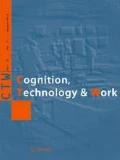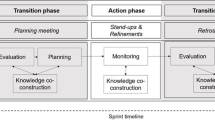Abstract
Metacognition related to team cooperation, which refers to an individual’s thought processes dealing with a group’s mindset regarding teamwork, is a possible cognitive mechanism behind an individual’s behaviors as part of that team/group. Our past studies have implied that expanding the metacognitive range during cooperation via appropriate instructions enhances team performance. However, one limitation of past work was allowing participants to provide self-report descriptions when reflecting on their cooperation. The current study developed methods for creating introspective reports on cooperative behavior using concept maps. Three forms of introspective reports on cooperative behavior were developed and applied to a team experiment. Characteristics of the three forms were analyzed; an improved version of a form was developed and verified. Subsequently, in order to develop more efficient and usable forms, participants’ concept maps were qualitatively analyzed. Finally, forms with a concept label, “Partner,” were developed and verified. The results suggested that they can increase descriptions about cooperation and enable participants to be aware of partners’ contributions in order to improve team performance.


























Similar content being viewed by others
References
Baker DP, Day R, Salas E (2006) Teamwork as an essential component of high-reliability organizations. Health Serv Res 41(4p2):1576–1598
Chang SN (2007) Externalising students’ mental models through concept maps. J Biol Educ 41(3):107–112
Chant SR, Ernst Z (2007) Group intentions as equilibria. Philos Stud 133(1):95–109
Cooke NJ, Gorman JC, Winner JL (2007) Team cognition. In: Durso F, Nickerson R, Dumais S, Lewandowsky PA (eds) Handbook of applied cognition, 2nd edn. Wiley, London, pp 239–268
Day DV, Fleenor JW, Atwater LE, Sturm RE, McKee RA (2014) Advances in leader and leadership development: a review of 25 years of research and theory. Leadersh Q 25(1):63–82
Endsley MR, Jones WM (2001) A model of inter- and intra- team situation awareness: implications for design, training, and measurement. In: McNeese M, Salas E, Endsley M (eds) New trends in cooperative activities: understanding system dynamics in complex environments. Human Factors and Ergonomics Society, Santa Monica, pp 46–67
Flin R, Martin L (2001) Behavioural markers for crew resource management. Int J Aviat Psychol 11:95–118
Gabelica C, Van den Bossche P, De Maeyer S, Segers M, Gijselaers W (2014) The effect of team feedback and guided reflexivity on team performance change. Learn Instr 34:86–96
Hetherington C, Flin R, Mearns K (2006) Safety in shipping: the human element. J Saf Res 37(4):401–411
Kanno T, Furuta K, Kitahara Y (2013) A model of team cognition based on mutual beliefs. Theor Issues Ergon Sci 14(1):38–52
Kramarski B, Mevarech ZR (2003) Enhancing mathematical reasoning in the classroom: the effects of cooperative learning and metacognitive training. Am Educ Res J 40(1):281–310
Letsky M, Warner N, Fiore SM, Rosen MA, Salas E (2007) Macrocognition in complex team problem solving. In: Proceedings of the 12th international command and control research and technology symposium (12th ICCRTS), Newport, RI, June 2007. Department of Defense Command and Control Research Program, Washington, DC
Lum HC, Fiore SM, Rosen MA, Salas E (2008, September). Complexity in collaboration: developing an understanding of macrocognition in teams through examination of task complexity. In: Proceedings of the human factors and ergonomics society annual meeting (vol 52, no 19, pp 1425–1429). SAGE Publications
Malakis S, Kontogiannis T, Kirwan B (2010) Managing emergencies and abnormal situations in air traffic control (Part II): teamwork strategies. Appl Ergon 41(4):628–635
Markham KM, Mintzes JJ, Jones MG (1994) The concept map as a research and evaluation tool: further evidence of validity. J Res Sci Teach 31(1):91–101
McDougall W (1921) The group mind. Putnam, New York
Nelson NO, Narens L (1994) Why investigate metacognition? In: Metcalfe J, Shimamura AP (eds) Metacognition: knowing about knowing. MIT Press, Cambridge, pp 1–25
Nonose K, Kanno T, Furuta K (2012) A team cognition model derived from reflection on cooperation. Cogn Technol Work 14(1):83–92
Nonose K, Kanno T, Furuta K (2014) Effects of metacognition in cooperation on team behaviors. Cogn Technol Work 16(3):349–358
Novak JD, Canas AJ (2007) Theoretical origins of concept maps, how to construct them and uses in education. Reflect Educ 3(1):29–42
Novak JD, Gowin DB (1984) Learning how to learn. Cambridge University Press, Cambridge
O’Connor P, O’Dea A, Flin R, Belton S (2008) Identifying the team skills required by nuclear power plant operations personnel. Int J Ind Ergon 38(11):1028–1037
Rousseau V, Aube C, Savoie A (2006) Teamwork behaviors: a review and an integration of frameworks. Small Group Res 37(5):540–570
Ruiz-Primo MA, Shavelson RJ (1996) Problems and issues in the use of concept maps in science assessment. J Res Sci Teach 33(6):569–600
Saito Y, Tonishi S (2008) Node compression and its effect in concept maps : for use as a tool of meta-cognition and meta-learning. J Res Sci Educ 49(2):19–27 [in Japanese]
Salas E, Stagl KC, Burke CS (2004) 25 years of team effectiveness in organizations: research themes and emerging needs. Int Rev Ind Organ Psychol 19:47–92
Schraw G (1998) Promoting general metacognitive awareness. Instr Sci 26(1–2):113–125
Scott J (2012) Social network analysis. SAGE Publications, New York
Tannenbaum SI, Cerasoli CP (2013) Do team and individual debriefs enhance performance? A meta-analysis. Human Factors 55(1):231–245
Tuomela R, Miller K (1988) We-intentions. Philos Stud 53:367–389
Veenman MV, Elshout JJ, Meijer J (1997) The generality vs domain-specificity of metacognitive skills in novice learning across domains. Learn Instr 7(2):187–209
Veenman MV, Van Hout-Wolters BH, Afflerbach P (2006) Metacognition and learning: conceptual and methodological considerations. Metacognit Learn 1(1):3–14
White BY, Frederiksen JR (1998) Inquiry, modeling, and metacognition: making science accessible to all students. Cognit Instr 16(1):3–118
White BY, Shimoda TA, Frederiksen JR (1999) Enabling students to construct theories of collaborative inquiry and reflective learning: computer support for metacognitive development. Int J Artif Intell Educ (IJAIED) 10:151–182
Author information
Authors and Affiliations
Corresponding author
Rights and permissions
About this article
Cite this article
Nonose, K., Okukubo, A., Yoda, Y. et al. Support for creating introspective reports detailing cooperative behaviors with concept maps. Cogn Tech Work 18, 71–88 (2016). https://doi.org/10.1007/s10111-015-0347-x
Received:
Accepted:
Published:
Issue Date:
DOI: https://doi.org/10.1007/s10111-015-0347-x



